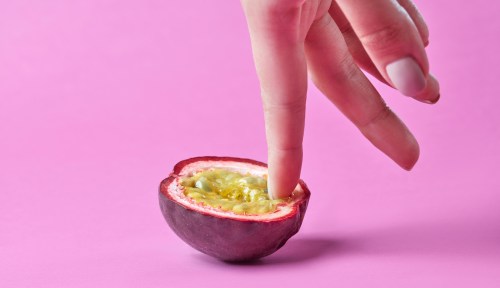Sex Experts Say Blue Balls (or Blue Vulva) Might Be the Secret To Deeper Satisfaction
Despite widespread belief, blue balls (and blue vulva) are actually not a medical ailment. Here, sex experts share how it can mean good news.

The sad truth is that most of us were socialized to believe that “blue balls”—a term that essentially describes genital discomfort following arousal that doesn’t result in ejaculation—is among the worst pain a penis-haver can endure. There’s also a layer of blame attached to its incidence, as in “Ugh, you gave me blue balls, and now I’m so uncomfortable.” The subtext here is that someone should feel personal guilt for their partner experiencing blue balls—perhaps to an extent that leads them to engage in sexual play beyond their comfort zone.
Experts in This Article
licensed psychologist and certified sex therapist
sex educator and owner of Early to Bed
In this way, the “blue ball” myth—more later on why it is, indeed, a myth and not cause for medical concern—has long been used to excuse sexual coercion and non-consensual behaviors. (The person enduring it may convince their partner to engage in sex acts to relieve the sensation.) But, when not used in this problematic framework, the essence of “blue balls energy” can actually level up a sexual experience.
Ahead, sexologists break down exactly what “blue balls” mean (and, crucially don’t mean). Plus, they explain how folks with any genitalia can use the physical sensation associated with the term to actually maximize pleasure. In fact, with a positive rebrand that centers consent, it stands to take your solo or partnered pleasure practice to new heights.
The read deal on blue balls (and blue vulva)
Officially known as epididymal hypertension, according to the International Society for Sexual Medicine (ISSM), the term names the physical sensation a person might experience when aroused for an extended period of time without reaching orgasm.
And despite the name’s implication, “blue balls” don’t discriminate by sex: As any vulva-owner who has ever had a vibrator lose charge in the middle of a solo sesh knows, penis-owners aren’t the only people who can experience some physical discomfort after being on the verge of orgasm and not getting to the finish line. When “blue balls” happen to vulva-owners, it’s known as either “blue vulva” or “pink pelvis.”
But while blue balls and blue vulva are a thing by this definition, they’re hardly the worst pain an individual can experience, says Jordan Soper, PsyD, CST, certified sex therapist with Promescent, a sexual wellness brand: “The sensation may be uncomfortable, but it is not damaging, deadly, or lasting,” she says, adding that it typically takes a few minutes to go away. Furthermore, according to sex educator Searah Deysach, owner of pleasure-product company Early to Bed, experiencing it is actually a good sign for your body’s sexual functioning, suggesting that you’re able to respond to arousing or sexual contact.
“The sensation may be uncomfortable, but it is not damaging, deadly, or lasting.” —Jordan Soper, PsyD, certified sex therapist
Understanding exactly how the heck blue balls or vulva could suggest such a thing requires an understanding the sexual response cycle. Devised by early sex researchers, the sexual response cycle says sexual encounters typically start with desire, before evolving to excitement and then orgasm.
When an individual begins to get sexually excited, blood flow is directed to the genitals, Dr. Soper says, which is the body physiologically readying itself for the sexual experience. In vulva-owners the increase in blood flow to the genitals supports the natural lubrication process, as well as engorges the clitoris, increasing sensitivity. In people with a penis, this is when the penis gets hard and the scrotum contracts, she adds.
During orgasm, the buildup of blood in the genitals releases. But what leads to blue balls or blue vulva is an individual moving through the desire and excitement phase of the sexual response cycle, but not moving onto the last step—orgasm—which would allow the blood flow to dissipate immediately, Dr. Soper says. In other words, despite blue balls popularly being regarded as a medical ailment, the occurrence actually suggests that the body is optimally achieving desire and excitement.
How to relieve blue balls or blue vulva
1. Try masturbating alone or in the presence of a partner
Though medically NBD, given that the sensation will go away on its own soon enough, a person experiencing discomfort associated with blue balls or blue vulva can take matters into their own hands—literally. But if you don’t want to wait for the blood to move back to your limbs naturally, the ISSM suggests masturbating.
If your partner(s) are still in your presence, you’ll need their consent before proceeding. But if they offer it, know that touching yourself after a partnered sexual experience, whether solo or next to a consenting partner(s), can be a great way to complete the sexual response cycle, Dr. Soper says. Masturbating allows you focus on your own orgasm, which can be beneficial for people who have trouble with partnered orgasm for any reason, including a mental block.
2. Embrace the power of edging
Another option for navigating blue balls or blue vulva is to lean into orgasm denial or edging, which involves intentionally delaying or denying yourself (or another individual, consensually) an orgasm in order to increase long-term sexual pleasure, according to Deysach. “Intentional orgasm denial builds up tension in the body so that when the orgasm finally happens, it feels bigger and more intense,” she says.
Dr. Soper adds that orgasm denial can prolong a sexual encounter, whether practiced during solo, partnered, or multi-partnered play, often in a BDSM context to solidify a dom/sub relationship: “Engaging in delaying or forbidding orgasm is used in power play dynamics in order to increase sensation, solidify the power position of the dominant party, or because it’s a part of the submissive’s kink,” she says.
Regardless of why you’re exploring orgasm denial, know that doing so in a partnered relationship can also increase connectivity, says Deysach. “When you practice edging or orgasm delay with a partner, you really need to be paying very close attention to what your lover is experiencing in order to make sure that they don’t orgasm too quickly,” she says. This can, in turn, give way to a deeper sense of intimacy.
Ultimately, though, just remember that neither blue balls nor blue vulva are abnormal, unhealthy, or the most painful thing in the world. And if you are experiencing a level of discomfort that is impacting your daily functioning, it’s best to seek medical support.
Sign Up for Our Daily Newsletter
Get all the latest in wellness, trends, food, fitness, beauty, and more delivered right to your inbox.
Got it, you've been added to our email list.










